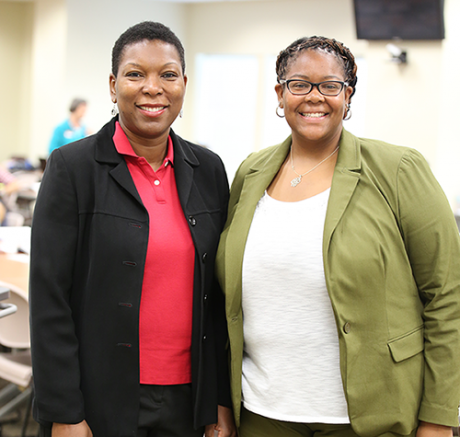PA Program Joins Effort to Demystify Mental Health


The College of Medicine started its new physician assistant program, in part, to help improve access to care for underserved populations.
Even before Florida State’s first class of PA students arrives next month, the new program is at work on its mission.
Addressing a dire need for more behavioral health services, Assistant Professor Susan Salahshor recently led a Mental Health First Aid for FSU faculty and staff, local nurse practitioners, Department of Health employees, physician assistants and other participants from outside of health care.
The purpose? To teach a five-step action plan preparing course participants to help loved ones, colleagues, neighbors and others cope with mental-health or substance-abuse problems.
At present, new patients could wait several months before getting an appointment with a psychiatrist. Mental Health First Aid – a course completed by more than 550,000 people nationwide – provides an additional safety net for some who otherwise couldn’t get immediate help.
“I think sometimes as medical folks we think we know how to deal with something, but this course is not about diagnosing or treating,” Salahshor said. “It’s about recognizing when someone is in trouble, whether it be a family member, friend or colleague, and being open to helping them and not judging them and the state they may be in.”
Salahshor taught the eight-hour course alongside Monica Albertie, a project manager in the Office of Health Disparities Research at the Mayo Clinic in Jacksonville. The need quickly became apparent when Salahshor received “a flood” of responses before having to turn away some due to a cap of 30 participants per session.
Just as CPR training helps a layperson assist an individual experiencing a heart attack, Mental Health First Aid training helps laypeople assist those experiencing a mental-health crisis.
“It’s important to realize that no matter who someone is, or what their title is, they could be going through a mental-health crisis that’s not recognized,” added Salahshor, who currently is president-elect of the Florida Academy of PAs.
The course also could benefit PA or medical students in need.
“These students are under increased stress for what they have to learn in a short period of time and it would be helpful for us as staff to be able to recognize if one of our students needs a little more help earlier rather than later,” Salahshor said. “We originally offered the course to the faculty and office members, but this is not just for health-care providers, this is for anyone.”
The course addresses a range of mental-health problems including depression, anxiety, trauma, psychosis and psychotic disorders, substance-use disorders and self-injury. Participants are taught to identify, understand and respond when someone may be in a mental health crisis and learn to effectively assist people in seeking professional help.
“What really stood out to me was the impact the course had on the non-clinical faculty and staff,” said James Zedaker, associate dean and founding director of the PA program. “I think that is just another example of how it can benefit the community to know the importance of recognizing when a loved one, coworker, or someone might need assistance. It’s also important to realize to what level you should be involved and when you should help them access further resources.”

